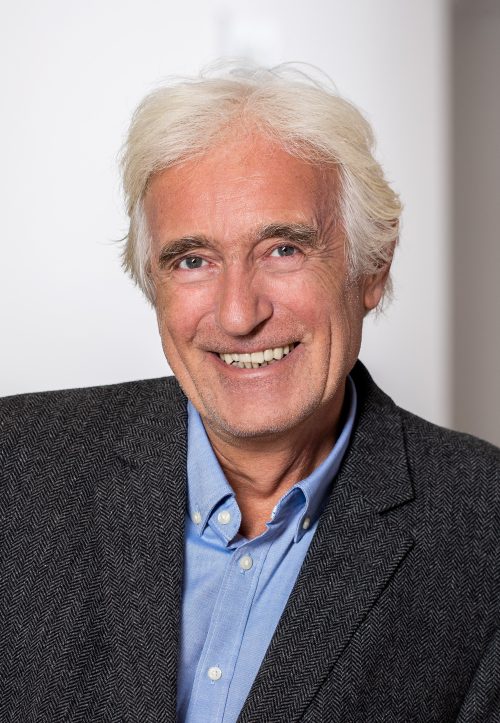Dr. Stefenelli at the Health Podcast MERCK Cast
Hello and welcome to MERCK-Cast – the Health Podcast.
In this episode, we’re diving into a topic that often follows us in our everyday lives and can be hard to escape, whether it’s at work or in our personal lives: that’s right, we’re talking about – have you guessed it yet? – yes, exactly: STRESS.
Today, we’ll be discussing how to manage stress so that it doesn’t negatively dominate our lives and what the effects on our hearts are. Joining us in the studio is our special guest.
I am therefore very pleased to welcome Univ.-Prof. Dr. Thomas Stefenelli to our show. Prof. Stefenelli is a specialist in internal medicine, cardiology, and angiology, working at the Co-Ordination Medical Center in the 8th district of Vienna. He was also the head of the first medical department at the Donaustadt Clinic of the Vienna Health Association.
Welcome Prof. Stefenelli.
Thank you for the invitation.
What does “stress” mean to you as a cardiologist?
The term “stress” is used and defined differently depending on the perspective, both in everyday language and in the professional literature. The word “stress” is derived from the Latin word ‘stringere’, which could be translated as ‘to tighten’ or ‘to tense’. In Italian today, it still means to tighten, make narrower, or bind.
Originally, the term “stress” was used in engineering to describe material fatigue caused by pressure or tension on metal. In 1936, Hans Selye first described stress biologically as – as he puts it – “the nonspecific response of the body to any demand” – stress – a nonspecific response of the body to a demand triggered by stressors, mediated by nerves and hormones.
So, in this definition, stress is very nonspecific?
Yes. Stressors can trigger nonspecific biological reactions, such as those we experience as a physical response to cold or fever, or they can manifest as psychological stress. These reactions enable us to cope with special demands under physical and mental stress.
Stress responses are not primarily negative, are they?
No. In terms of evolutionary history, without situatively adequate stimulation through stress hormones and consequently activation of our cardiovascular system, optimization of respiration, prioritization of cognitive centers, and mobilization of our energy reserves for our maximally perfused skeletal muscles, we would have become extinct already at the first confrontation with a mammoth or predator.
Physiologically, in healthy subjects, there is a reproducible and non-gender-differentiated short-term, significant increase in catecholamines, free fatty acids, and blood glucose levels, as well as diastolic blood pressure and peripheral vascular resistance during both mental and physical stress exposure.
Simultaneously, energy-consuming organ systems that are not necessarily needed for fight or flight are effectively shut down: the intestinal musculature relaxes, digestion or sexual functions are inhibited, and the activation of our immune system decreases.
In short, optimal metabolism of skeletal muscles, relaxed respiratory muscles, and adjusted cardiac output are prerequisites for peak performance – which would not be possible without our stress responses.
Accordingly, the recovery phase following a period of stress is crucial – whether it’s the joyful feast after a successful mammoth hunt, the celebration after a sports event victory, or a casual after-work gathering following a hectic day at work.
During this process, the autonomic nervous system can counterregulate towards regeneration through vagal stimulation after a phase of activation.
Crucially, achieving a balance between stress and relaxation, as well as between activity and passivity, stimulation and rest, appears to be essential. What happens when this balance is disturbed?
The positively perceived eustress – from the excitement before a date to the thrill before a bungee jump – is a physiological reaction of our organism that enables us to cope with challenging tasks, stressors, or emotions; it enhances attention and promotes maximum performance.
In contrast, distress is triggered by negative stressors.
Key factors of distress include lacking adaptations or compensations as well as inadequate counter-regulations or individual stress-coping mechanisms.
Situations or phases in which particular demands exceed an individual’s coping abilities can lead to a decrease in attention and performance, as well as trigger, exacerbate, and negatively impact our health.
How can prolonged or poorly compensated stress affect our cardiovascular system?
In addition to the direct effects on the arteries, significant risk factors for atherosclerosis are also activated.
The stress hormones noradrenaline, adrenaline, dopamine, and cortisol acutely induce vasoconstriction – narrowing of the arteries – leading to an increase in blood pressure, and over time, they elevate the risk of arterial hypertension and cardiovascular events.
A recent long-term observation indicates that after 6 years, with a doubling of just one of these mentioned hormones, manifest hypertension occurs in approximately one out of every four subjects.
This is consistent with older data showing that individuals with a family history of hypertension had elevated catecholamine levels measured years before the manifestation of their own hypertension.
Furthermore, during stressful periods in life, nicotine and alcohol consumption increase.
The stress-induced increase in the expression of the appetite hormone ghrelin enhances cravings for sweets and consequently increases body weight.
When considering the interactions between cortisol, blood sugar, and diabetes:
The stress hormone cortisol stimulates glucose release and simultaneously inhibits insulin action, leading to insulin resistance.
Several scientific publications describe clear correlations between occupational stress and job insecurity, on one hand, and overweight and pathological increases in glucose, insulin, as well as total cholesterol and triglycerides, on the other hand.
Here, several circles associated with stress close around the metabolic syndrome.
In summary, individuals with a low ability to cope with stress have a high-risk profile for atherosclerosis.
Clinical data support a close relationship between elevated cortisol levels and the occurrence of coronary syndromes and strokes.
And also in patients with peripheral arterial disease, which involves narrowing in the leg arteries with clinical signs of intermittent claudication, chronic stress appears to be associated with earlier overall mortality.
How can stress be reduced now? Do you have tips?
You can also find plenty of tips on patient websites of major hospitals on how to do this.
Let’s try to establish individual ways to find balancing calmness after stressful situations.
The spectrum can range from short breaks or pauses, sufficient sleep, regular nutrition, and exercise or active sports to relaxation techniques such as breathing exercises to yoga.
Let’s engage in positive conversations, whether in person or over the phone, and let’s not forget about visits to friends, hobbies, or involvement in clubs and activities.
Let’s prioritize and try to focus on positive aspects –
Hearty laughter has been shown to improve our hemodynamics or the performance of our heart.
If these measures are not sufficient during a phase of life, and you experience additional symptoms of excessive stress such as sleep disturbances, depressive mood or anxiety, headaches or muscle and joint pain, gastrointestinal complaints, or cardiac symptoms, do not hesitate to seek professional help early on to accept personal tips for stress management.
We can learn to manage even strong stress effectively. Stress should not negatively dictate our lives.
Dear Prof. Stefenelli. Thank you for our stress-free conversation and for being with us. And thank you for listening.

Dr. Thomas Stefenelli, MD, is a specialist in internal medicine, cardiology, and angiology, as well as a certified expert witness in court. His professional focus areas include: heart failure, coronary artery disease/angina pectoris, atherosclerosis/vascular diseases, and heart valve diseases.

